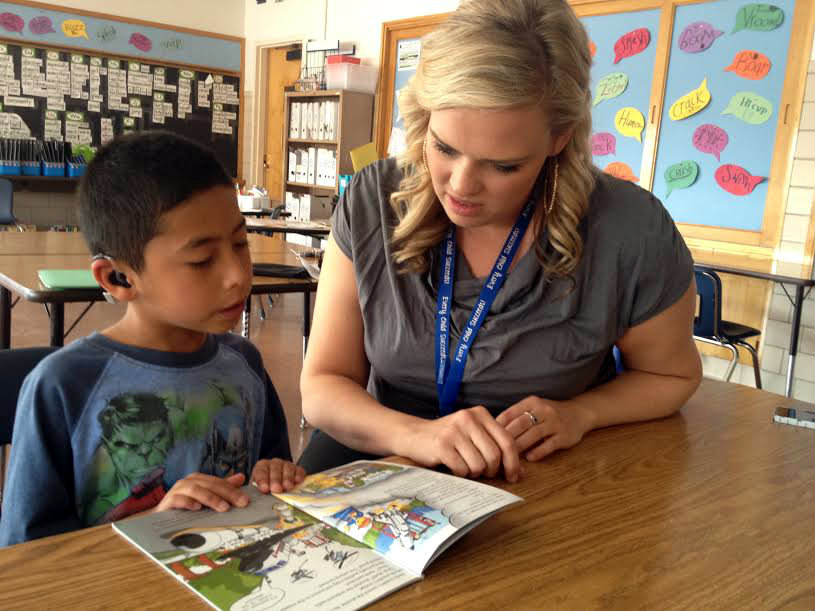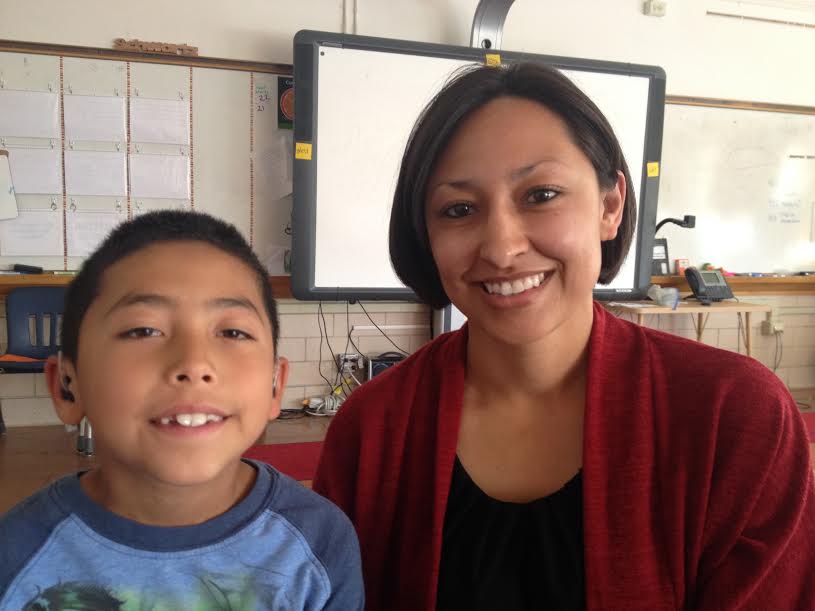
Third-grade teacher Kyle Schwartz didn’t think a lesson asking her students what they wish she knew about them would elicit such a powerful response.
She tweeted some of the comments from her students at Denver’s Doull Elementary -- and the response from around the world was overwhelming. Teachers across the country tried out the lesson in their classrooms. The national media even picked up the story.
CPR’s education reporter Jenny Brundin talked with Kyle Schwartz in her classroom about why she did this.
Jenny Brundin: The lesson you came up with was for all children to write down one thing they wanted to say to you but wouldn’t normally in the classroom situation. What made you assign the lesson, “I Wish My Teacher Knew”?
Kyle Schwartz: I think it came out of conversations that teachers have all the time about "what’s going on with this kid," "how could I best help that kid." And so instead of making assumptions about my students, I really decided to let them tell me. When it happens in a classroom setting, when students feel like they can advocate for themselves, that’s when we can build a really strong community in our classrooms.
Here is what some of her students wrote:
Had my students write "I wish my teacher knew___" It's a reality check. #edchat #fellowschat pic.twitter.com/8vFUZqQnu0
#iwishmyteacherknew how much I miss my dad since he got deported #edchat #ImmigrationReform pic.twitter.com/yUK0FCwwiO
#iwishmyteacherknew sometimes my reading log isn't signed because my mom is not around a lot #edchat pic.twitter.com/mUsm4zRdKc
#iwishmyteacherknew Vietnamese because then she can say words I forget pic.twitter.com/lEFdKxe136
Jenny Brundin: More than 90 percent of the students at you school qualify for free or reduced lunch – that means most live in poverty. Without knowing that statistic, as a teacher, can you see this in your children?
Kyle Schwartz: I think that would be a difficult question to answer because I’ve only ever worked in schools with this demographic so I don’t really have a base to compare it with. But what I do see in my students is this relentless attitude of hard work. They come every day and they read for an hour and a half every day, they come in and they write circles around kids, they write computer code. So I couldn’t really compare them to other students but what I do see is this huge presence of grit within my students. That makes me so proud of them as a teacher.
Jenny Brundin: Poverty is such a complex problem – some might say it’s because of deep structural inequities in society, others say what children in poverty need are better funded schools and smaller class sizes. What do you believe your children need?
Kyle Schwartz: I do believe that we need properly funded school systems. I think that’s not a problem unique to Denver at all. I think that goes across the country. I also feel that children need an outlet to explore their passions. They need a voice in their classroom and they need a supportive environment to take risks, to be vulnerable, to do the challenging work of learning, often times in a second language. So I feel like a lot more resources in our school [would help]. And so I hope our city can rally together and provide those but I also feel that kids just need to be kids and they need to be cared about.
Jenny Brundin: Everything that is going on at home, a child carries with them into the classroom. And I wonder how you – how other teachers - manage your emotions surrounding the fact that there are many things in the lives of your students that are beyond your control?
Kyle Schwartz: I think that people who don’t work in education and who don’t work in these schools would think that, 'oh a kid who has these challenges, that’s all they have is challenges.' But you would be amazed to see just how resilient kids are. And sometimes what’s going on with them is not them focused on what they don’t have or this need that’s not met. Sometimes what’s going on with them is, ‘I need to learn more about what’s going on with dinosaurs and my teacher needs to teach me because that’s exactly what I need to know.'
But there are situations that just break your heart, when you hear about it as a teacher, that just are really heart wrenching. It’s just devastating that kids have to go through some things that are so far beyond their years. It’s just devastating that parents who love their kids so much and value education so deeply have struggles that prevent them from getting everything they need for their kid. And it’s heartbreaking, but as teachers, we go on.
My goal is you are going to read regardless, you are going to know your multiplication facts regardless of what’s happening at home. So that attitude of regardless, that attitude of pushing kids even further, helping them reach their dreams. I think that’s what teachers have, we don’t typically get bogged down or feel defeated by the struggles that they face. At least not the teachers that I know in Denver. We really try to look for, how can I get this kid to reach their goal because at the end of the day, that’s what I want for my kids.

Jenny Brundin: I want to turn to one of the parents in your class, Vanessa Flores. A relationship between a teacher and child is based on a lot of trust. But as a parent do you worry about some of the comments being public?
Vanessa Flores: I don’t. I trust Doull [Elementary]. I trust the teachers here. When I saw the posting, I reached out by email to Ms. Schwartz and I said, ‘you know’ – just out of curiosity, what did my child share?’ And I did tell her, ‘if it is something [private], I don’t want you to have to break that trust,’ she didn’t have to relay it to me. I know, just as a parent, how far that trust goes and I want the teachers to have that with my children. And if there is something going on at home and my child has shared that, then I need to be open to maybe making sure that maybe there is something I need to fix at home, maybe I do need help. If I cannot be open as a parent to know that I need help with my children, then I feel shame on me.
(Schwartz posted the comments anonymously and if a child didn’t want to share his or her comment with the class, he or she didn’t have to.)
Jenny Brundin: Kyle, what have the kids taught you through this lesson?
Kyle Schwartz: I think mainly what the kids have really taught me is how they’re able to support each other, that they were able to share what they needed with their class and then those classmates stepped up. So just talking to kids today, they heard another student say, ‘I don’t have a friend,” and they realized ‘I can be that friend.’ And so that has been really powerful. But I think also been powerful that their story has been just picked up all over the world and they can finally realize just how powerful they are, that as kids, even 8 years old, 9 years old, that if they show that kindness, that if they develop that empathy, that will be noticed the world round and they really can make this change that we talk about in schools.
Jenny Brundin: Give us a sense of how many tweets or how many people this issue has touched so far. You’ve been on CNN and lots of national news outlets. And why do you think this issue is getting this kind of response?
Kyle Schwartz: I have gotten messages from all over the world that teachers are doing this with their kids. I’ve gotten messages from Indonesia, Brazil, Turkey, and Denmark, just all over the world. It’s just so shocking that they’ve all heard about this. But I believe what’s really [driving] the attention is the authenticity that the kids had in sharing this and the realness that they bring to their answers. I think there’s something universal about being a kid in a school and wanting your teacher to know who you are and wanting the world to know who you are and wanting to feel cared about and I think that crosses all boundaries.
Jenny Brundin: What are you hoping for now?
Kyle Schwartz: I would love to be an advocate for education and to help get these kids what they need. We have talked about a “Book Harvest,” just a simple way to get books from kids who are done reading them to kids who would love to read them. I would love to see Denver getting the books to kids who need them. It’s just a simple way that we can support our community.
I would encourage people to find a school in your community that needs support and provide it. (DonorsChoose.org is an online charity on which public school teachers have posted their needs for schools and school projects.) Especially in Denver you’re not more than 10 minutes away from a school that’s just like mine. I would love for people to reach out to their schools in their communities to see what resources they have that they could strengthen.








